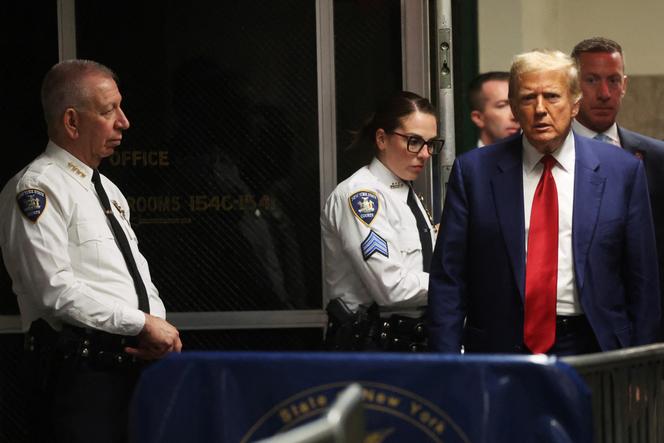


A New York judge on Monday, March 25, ordered former president Donald Trump's criminal trial on charges of paying pre-election hush money to a porn star to begin on April 15. Trump's lawyers had been seeking to delay the trial, which had been scheduled to begin on Monday, for at least 90 days but Judge Juan Merchan ordered jury selection to begin on April 15.
The presumptive Republican presidential nominee arrived in court for a hearing scheduled in place of the long-planned start of jury selection in the first of his four criminal cases to go to trial. It took place on a uniquely consequential day for Trump and his legal and political affairs as, besides a likely determination of a trial date, a New York appeals court on Monday granted him a dose of good news by agreeing to hold off collection of his $454 million civil fraud judgment – if he puts up $175 million within 10 days.
Judge Juan M. Merchan scolded the former president's lawyers as he weighed when to reschedule the trial after a last-minute document dump caused a postponement of the original date. The judge bristled at what he suggested were baseless defense claims of "prosecutorial misconduct," appearing unpersuaded by Trump team arguments that prosecutors had until recently concealed tens of thousands of pages of records from a previous federal investigation. Merchan, who earlier this month postponed the trial until at least mid-April, told defense lawyers that they should have acted much sooner if they believed they didn't have all the records they felt they were entitled to.
The hush money case, filed last year by prosecutors in Manhattan, has taken on added importance given that it's the only one of the prosecutions against Trump that appears likely for trial in the coming months. The simmering documents dispute is significant to the extent it results in a meaningful delay to the trial, which centers on years-old allegations that Trump arranged a payment to a porn actor during his 2016 presidential campaign to suppress claims of an extramarital affair.
Trump has pleaded not guilty to charges that he falsified business records. Manhattan prosecutors say Trump did it as part of an effort to protect his 2016 campaign by burying what he says were false stories of extramarital sex. Trump on Monday repeated to reporters his claims that the case is a "witch hunt" and "hoax." The prosecutor overseeing the case, Manhattan District Attorney Alvin Bragg, is a Democrat.
The case centers on allegations that Trump falsely logged $130,000 in payments as legal fees in his company's books "to disguise his and others' criminal conduct," as Bragg's deputies put it in a court document.
The money went to Trump's then-personal attorney Michael Cohen, but prosecutors say it wasn't for actual legal work. Rather, they say, Cohen was just recouping money he'd paid porn actor Stormy Daniels on Trump's behalf, so she wouldn't publicize her claim of a sexual encounter with him years earlier. Trump's lawyers say the payments to Cohen were legitimate legal expenses, not cover-up checks.
Cohen pleaded guilty in 2018 to federal charges, including campaign finance violations related to the Daniels payoff. He said Trump directed him to arrange it, and federal prosecutors indicated they believed him, but they never charged Trump with any crime related to the matter. Cohen is now a key witness in Manhattan prosecutors' case against Trump.
Trump's lawyers also have sought to delay the trial until after the Supreme Court rules on his claims of presidential immunity in his election interference case in Washington. The high court is set to hear arguments April 25.
